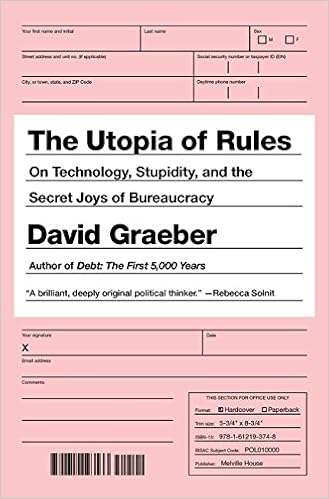
The Utopia of Rules by David Graeber is an engaging riff on the theme of bureaucracy and the BS people think about it.
"De-regulation," of finances, Graeber points out, creates more rules, paperwork, and bureaucrats, apparently because what happens is not the equivalent of firing a bunch of factory safety inspectors, but rather the employment of enough bureaucrats to redirect control of wealth from mid-sized companies to giant conglomerates. Yet, just as people imagine criminals to be mostly black or violent, or war to be philanthropic or necessary, or estate taxes to be about family farms, or voter fraud to be impacting elections, or elections to have any value that could possibly be hurt by voter fraud, or a minimum wage to eliminate jobs, or corporate trade agreements to not eliminate jobs, or guns to make us safer, or prisons to "correct" something, or wealth to trickle down, or small-time foreign thugs to constitute a graver threat than a McDonald's diet, what matters is a fiction well told, not any facts.
Career advancement in a bureaucracy, Graeber writes, is based not so much on merit as on the loyalty exhibited by a willingness to pretend that it's based on merit. If you play along with the collective delusion, you're rewarded.
"Globalization" is not about tearing down borders, but rather trapping people behind militarized borders within which public supports can be denied and workers can be compelled to work for little or nothing -- in other words, a species of bureaucratization. The effort to create a truly borderless and fair world is known as "anti-globalization."
The "free market" means heavier bureaucracy, and an expansion of those areas of life that come under the control of state violence. This was the story of Russia's transition from state to private economics, Graeber writes: more bureaucrats, not fewer.
When police bring law and order, we picture them turning a violent situation non-violent. In fact, they are not involved in most violent crime, and mostly show up to nonviolent situations which they turn violent. You have a much higher chance of being killed by police than by the terrorists they are now mostly imagined as combatting.
When someone tells you to be "realistic" about such supposed fantasies as peace or justice, they are not telling you to recognize how things are, as they and you may imagine they are, but rather they are telling you to acknowledge the violence by which the state can impose its will no matter how stupidly it might choose to do so. "Real" in this usage comes from the Spanish real meaning royal or belonging to the king, not the Latin res or thing. It is the royal usage that created such phrases as "real property" or "real estate." The point is not that a house truly exists, but that the king ultimately owns it. To "be realistic" about violence simply means to be violent about violence. After all, we all know violence exists; some of us choose not to multiply it.
Cutting taxes on "job creators" doesn't create any jobs, just the reverse. With more wealth, they do things like taking their pay in stock options, and then using extra money that could have gone into new hires or raises or research for stock buybacks. The result is a weaker economy inhabited by people convinced it's both a stronger economy and an inevitable economy against which one need not waste any energy struggling for change.
Why don't we have robots doing our factory work and house work? Why don't we have useful technological advances on the scale of previous eras? Graeber writes that the most immediate reason is that 95% of robotics funding has gone through the Pentagon which has no interest in such matters and is more interested in destructive inventions like killer drones.
In addition, robots are understood as job killers rather than time savers because we offer no one a guaranteed income even if they don't need to work. We begin with the requirement that everyone work no matter what, and then figure out stuff they can do to fulfill that requirement -- such as trying all day to get us to switch from one giant phone company to another.
Another problem is innovative corporate culture that kills innovation by investing in only sure things, requiring everyone to invest time in PR, and multiplying bureaucracy.
People are told to cling to the American freedom of private health insurance companies as an act of rebellion against government bureaucracy, even as the insurance corporations create vastly more bureaucracy, paperwork, sickness, and death.
We don't notice bureaucracy, Graeber believes, because it has mushroomed. The average American will spend 6 months of their life waiting for stoplights to change and some larger length of time filling out forms.
We don't notice bureaucracy, think we despise it, and secretly love it, Graeber thinks -- love it because it is the enemy of unpredictable and improvisational play, which we've been conditioned to believe is dangerous. Of course, the opposite is true.
The preceding is a sampling of Graber's book and my thoughts on it, not a summary. I urge you to dive into it yourself. It's a book that intentionally raises many large questions. A couple of small ones stand out as flaws, however: 1) Why in the world does the author keep his money in Bank of America? 2) Why does he imagine that the "War on Terror" has ended? The whole point of a war on terror is that it's not endable, as terror can never be eliminated. Nor of course can it be outdone in terrorizing by anything moreso than war.
No comments:
Post a Comment